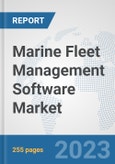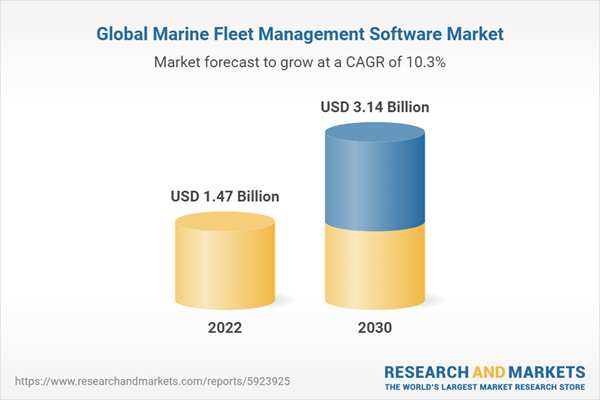Marine fleet management software plays a crucial role in optimizing fleet operations and extracting valuable insights from ship management data. To efficiently handle extensive fleets, data-intelligent marine fleet management software is essential. A holistic, integrated solution offers the necessary insights for increased efficiency, reduced Operational Expenses (OPEX), and sustained competitiveness in the maritime sector. Typically employed by fleet management companies overseeing crewing, maintenance, and day-to-day operations, this software allows ship owners and managers to concentrate on cargo booking. Modules encompass maintenance, operations, inventory, crew, safety, finance, and purchase management. Cloud-based services adoption is anticipated to provide enhanced business opportunities, driven by increased demand for comprehensive marine fleet management solutions in the shipping industry.
The growing emphasis on regulatory compliance within the maritime industry acts as a key driver for the marine fleet management software market. With stringent regulations governing safety, environmental standards, and operational practices, there's an increasing need for comprehensive software solutions. These systems ensure adherence to regulations, streamline reporting processes, and enhance overall operational efficiency. As the maritime sector seeks to meet evolving compliance requirements, the demand for advanced fleet management software with robust regulatory features continues to rise, driving the market forward. The software becomes a strategic asset for companies aiming to navigate complex regulatory landscapes while optimizing their fleet operations. Additionally, the imperative need for enhanced operational efficiency and actionable insights in ship management boost the growth of the market. With the complexities of modern fleets, an integrated approach is essential to gain efficiency, reduce operational costs, and sustain competitiveness in the maritime sector. The demand is further driven by fleet management companies seeking solutions for crewing, maintenance, and day-to-day operations, allowing ship owners to focus on cargo booking. As the shipping industry increasingly embraces cloud-based services, the adoption of comprehensive and modular marine fleet management solutions grows, reflecting a crucial shift toward streamlined, data-driven practices for centralized administration and improved business performance. However, limited adoption due to high initial implementation costs and resistance to technology integration hinders the growth of the Marine fleet management software market. Furthermore, the rising demand for efficient fleet operations, enhanced data insights, and the adoption of cloud-based solutions in the maritime industry create a significant opportunity for growth of the market.
North America is projected to hold the most prominent market share in the upcoming forecast period. The region dominance is attributed to the well-established maritime industry, a high adoption rate of advanced technologies, and stringent regulatory requirements. Additionally, the focus on enhancing operational efficiency, ensuring safety compliance, and the presence of key market players contribute to North America's leadership in the marine fleet management software sector. The North America commitment to innovation and technological advancements further solidifies its position as a major hub for the adoption and development of cutting-edge solutions in the maritime domain. Moreover, Asia Pacific is poised to exhibit the fastest-growing region over the forecast period. Region growth is, fueled by robust maritime activities, increasing fleet sizes, and rising demand for operational efficiency. Countries like China, South Korea, and Japan lead in shipbuilding and maritime trade, driving the need for advanced software solutions. Additionally, stringent regulations and a growing focus on maritime safety and sustainability contribute to the rapid adoption of marine fleet management software in the region. The Asia-Pacific's dynamic shipping industry and the quest for streamlined operations position it as a key growth hub for marine fleet management software solutions.
Report Findings
1) Drivers
- The growing emphasis on regulatory compliance within the maritime industry acts as a key driver for the marine fleet management software market.
- The imperative need for enhanced operational efficiency and actionable insights in ship management boosts the growth of the market.
2) Restraints
- Limited adoption due to high initial implementation costs and resistance to technology integration hinders the growth of the marine fleet management software market.
3) Opportunities
- The rising demand for efficient fleet operations, enhanced data insights, and the adoption of cloud-based solutions in the maritime industry create a significant opportunity for growth of the market.
Research Methodology
A) Primary Research
The primary research involves extensive interviews and analysis of the opinions provided by the primary respondents. The primary research starts with identifying and approaching the primary respondents, the primary respondents are approached include1. Key Opinion Leaders associated
2. Internal and External subject matter experts
3. Professionals and participants from the industry
The primary research respondents typically include
1. Executives working with leading companies in the market under review2. Product/brand/marketing managers
3. CXO level executives
4. Regional/zonal/ country managers
5. Vice President level executives.
B) Secondary Research
Secondary research involves extensive exploring through the secondary sources of information available in both the public domain and paid sources. Each research study is based on over 500 hours of secondary research accompanied by primary research. The information obtained through the secondary sources is validated through the crosscheck on various data sources.The secondary sources of the data typically include
1. Company reports and publications2. Government/institutional publications
3. Trade and associations journals
4. Databases such as WTO, OECD, World Bank, and among others.
5. Websites and publications by research agencies
Segment Covered
The global marine fleet management software market is segmented on the basis of component, deployment type, and end user.The Global Marine Fleet Management Software Market by Component
- Solution
- Services
- Software
The Global Marine Fleet Management Software Market by Deployment type
- Premise based deployment
- Cloud based deployment
The Global Marine Fleet Management Software Market by End User
- Ports and terminals
- Shipping Industries
- Maritime freight forwarders
Company Profiles
The companies covered in the report include- BASS Software Ltd
- ABS Group
- DNV AS
- ConnectShip, Inc
- Hanseaticsoft GmbH
- Kongsberg Maritime
- JiBe ERP
- Helm Operations Software Inc.
- Marasoft B.V
- SERTICA
What does this Report Deliver?
1. Comprehensive analysis of the global as well as regional markets of the marine fleet management software market.2. Complete coverage of all the segments in the marine fleet management software market to analyze the trends, developments in the global market and forecast of market size up to 2030.
3. Comprehensive analysis of the companies operating in the global marine fleet management software market. The company profile includes analysis of product portfolio, revenue, SWOT analysis and latest developments of the company.
4. Growth Matrix presents an analysis of the product segments and geographies that market players should focus to invest, consolidate, expand and/or diversify.
Table of Contents
Companies Mentioned
- BASS Software Ltd
- ABS Group
- DNV AS
- ConnectShip, Inc
- Hanseaticsoft GmbH
- Kongsberg Maritime
- JiBe ERP
- Helm Operations Software Inc.
- Marasoft B.V
- SERTICA
Table Information
| Report Attribute | Details |
|---|---|
| No. of Pages | 255 |
| Published | December 2023 |
| Forecast Period | 2022 - 2030 |
| Estimated Market Value ( USD | $ 1.47 Billion |
| Forecasted Market Value ( USD | $ 3.14 Billion |
| Compound Annual Growth Rate | 10.3% |
| Regions Covered | Global |
| No. of Companies Mentioned | 10 |









